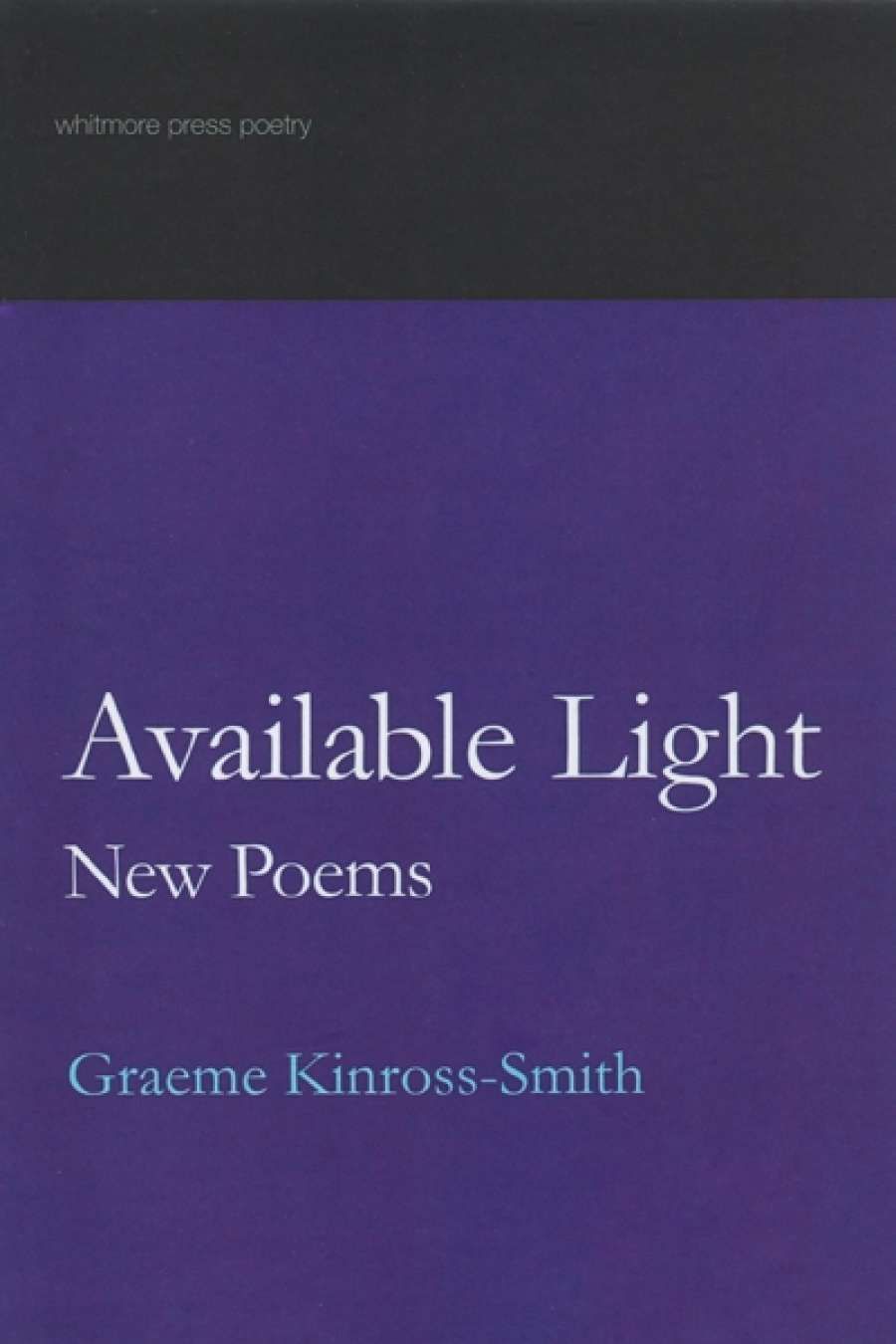
- Free Article: No
- Contents Category: Poetry
- Review Article: Yes
- Online Only: No
- Custom Highlight Text:
Facing the first poem in Graeme Kinross-Smith’s new book Available Light is a quote from Margaret Atwood’s Negotiating with the Dead (2002): ‘The mere act of writing splits the self in two.’ When you write, not only are you a writer, but you are your own first and very present reader. Suddenly, all alone at your desk, you have company. The first section of Kinross-Smith’s book focuses not so much on the act of writing as on the split self. In poems such as ‘In my wheat-bag hood’, ‘Commas’, ‘if I be not I …’ he observes possible past selves and his future. ‘Commas’ uses the metaphor of a man skimming stones across a pool:
- Book 1 Title: Available Light
- Book 1 Biblio: Whitmore Press, $24.95 pb, 115 pp, 9780987386601
One day there’ll be a final stone. Then it will be
all up with him, and yet he bends, selects
and throws, measuring with his eye
his life’s wavering flight of blunders
and delight – each day a stone: every stone
conjuring those further waiting, listening,
inveterate, wise days.
‘Measuring with his eye his life’s wavering flight’ is a good description of the whole book. Kinross-Smith is known as a photographer as well as a prose writer and poet, and the title Available Light is a term for a type of photography relying on natural or ‘found’ conditions, where the artist does not add lighting. However, I don’t agree with Geoff Page’s back-cover blurb that for Kinross-Smith ‘the poem, like a photograph, is a stilled moment taken from the flux of life’. In fact, Kinross-Smith’s poems, though framed with a photographer’s eye, are more like short films. They are often in motion: on trains, diving underwater, climbing hills. One of my favourite poems in the collection, ‘paean for gardening for money’, tells of an adolescent boy’s awakening sexuality in a beautiful, filmic montage of scenes, none of which is a still. A key poem addressing the art of photography itself is ‘Watching’, which contains the lines: ‘nor does my lens tell me why it searches’ and ‘… the long lens sucks secrets in. There’s one more person watching / than I think.’
Perhaps it is a photographer’s love of form that leads Kinross-Smith to include a number of ‘shape’ poems in this collection, but the results are mixed. One of the best examples is the poem ‘Carpet Sharks’. The three stanzas could be set out to imitate the skin pattern of a certain species (perhaps the grey carpet shark), or they could simply be a visual representation of a diver’s descent. This shape poem works well, not only because the word imagery is so deft, but also because the lineation fits the subject of the diver’s encounter with these stolid prehistoric beasts, moving from longer lines of surface activity to single-word stillness:
fronts and news and months
stutter through bass strait
but down in this green-
blue dark i find earth’s
history is modern trim
i swim closer blunt
heads out of time
eye me but
are not
about
to budge
‘Jouer au tennis’ is shaped like a pair of tennis racquet covers, and deals with a child’s perception of his mother’s tennis afternoons. But does the shape help or hinder the poem? It seems inconsequential. ‘Spring time’, ‘Excellence’, ‘from the train’, ‘cold front’, and many other poems in the collection are centre-aligned without much effect except breaking the syntax and making the eye dart around more on the page.
As well as shape poems, Available Light includes several prose poems. What constitutes a prose poem, apart from the obvious facts that it goes to the right-hand edge of the page and is made of paragraphs, not lines and stanzas? I would define it as prose with the language density of poetry, looking like a short story, but not necessarily employing a narrative. Prose poems in Available Light include ‘Fences with Sheet Music’, ‘Innings’ – a home movie from the past of country children playing cricket on an improvised pitch, and the delightful ‘considering his life’ – a moody, wistful self-portrait of what the author requires for happiness. Gardens, golf, photography, and jazz all figure here, along with ‘her whispers in the dark taking me through the street directory of her dreams …’ At the same time, the poem is a kind of memento mori, deeply aware of the impermanence of the author’s self-definition through the things he loves.
This new collection caused me to pull out my copy of Turn Left at Any Time with Care (1975), Kinross-Smith’s first volume, which he shared with Jamie Grant. It is interesting to see similar preoccupations: diving, photography, planes, Kinross-Smith’s home territory of the Barrabool Hills near Geelong.
Occasionally, Available Light suffers from obscurity, from too-private references to particular photographs, literary biography, or pieces of music. In a poem like ‘metaphor strayed’, you are left wondering just where it has strayed, and in the ‘Forget Rilke’ section, with its introductory quote from Charlie Parker (‘if you don’t live it, it won’t come out of your horn …’), some free-forming doesn’t succeed.
Overall, though, this collection is intriguing and refreshing. As in the ‘Carpet Sharks’ poem, there is another world below the surface of the lines; it just takes a bit of effort to swim down. Sometimes you get lost where the light does not reach, but more often than not you are rewarded with something exciting.


Comments powered by CComment